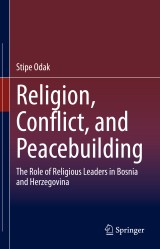Details

Religion, Conflict, and Peacebuilding
The Role of Religious Leaders in Bosnia and Herzegovina|
85,59 € |
|
| Verlag: | Springer |
| Format: | |
| Veröffentl.: | 27.10.2020 |
| ISBN/EAN: | 9783030551117 |
| Sprache: | englisch |
Dieses eBook enthält ein Wasserzeichen.
Beschreibungen
<p>This book provides fresh insights into the role of religious leaders in conflict transformation and peacebuilding. Based on a large dataset of interviews with Christian and Muslim leaders in Bosnia and Herzegovina, it offers a contextually rich analysis of the main post-conflict challenges: forgiveness, reconciliation, and tragic memories. Designed as an inductive, qualitative research, it also develops an integrative theoretical model of religiously-inspired engagement in conflict transformation. The work introduces a number of new concepts which are relevant for both theory and practice of peacebuilding, such as Residue of Forgiveness, Degree Zero of Reconciliation, Ecumene of Compassion, and Phantomic Memories.</p><p> </p>The book, furthermore, proposes two correlated concepts – “theological dissonance” and “pastoral optimization” – as theoretical tools to describe the interplay between moral ideals and practical limitations. The text is a valuable resource for religious and social scholars alike, especially those interested in topics of peace, conflict, and justice. From the methodological standpoint, it is an original and audacious attempt at bringing together theological, philosophical, and political narratives on conflicts and peace through the innovative use of the Grounded Theory approach.<p></p><p></p>
<p>Preface: A universe and an origami – Conducting an interdisciplinary work.- Introduction.- Methodology.- Chapter 1. Forgiveness.- Chapter 2. Reconciliation.- Chapter 3. Memory.- Chapter 4. Peacebuilding roles of religious leaders.- Chapter 5. The square of religious influence – an integrative model for understanding religion, conflicts, and peacebuilding.</p>
<p></p><p>Stipe Odak is a post-doctoral researcher at the Institut de sciences politiques Louvain-Europe (Université catholique de Louvain). He obtained his Ph.D. in Political and Social Sciences from the UCLouvain and a doctorate in Theology (S.T.D.) from KU Leuven. Previous to his doctoral studies, he graduated with master’s degrees in Sociology, Comparative Literature, as well as in Theology and Religious Studies from the University of Zagreb (Croatia), and KU Leuven (Belgium).</p>
<p>His main research topics are religion, collective memory of conflicts, and peacebuilding.</p>
<p>He is a laureate of several poetry awards in Croatia and Bosnia and Herzegovina and a member of the Bosnian-Herzegovinian branch of the PEN International writer’s association.</p><br><p></p>
<p>His main research topics are religion, collective memory of conflicts, and peacebuilding.</p>
<p>He is a laureate of several poetry awards in Croatia and Bosnia and Herzegovina and a member of the Bosnian-Herzegovinian branch of the PEN International writer’s association.</p><br><p></p>
<p>This book provides fresh insights into the role of religious leaders in conflict transformation and peacebuilding. Based on a large dataset of interviews with Christian and Muslim leaders in Bosnia and Herzegovina, it offers a contextually rich analysis of the main post-conflict challenges: forgiveness, reconciliation, and tragic memories. Designed as an inductive, qualitative research, it also develops an integrative theoretical model of religiously-inspired engagement in conflict transformation. The work introduces a number of new concepts which are relevant for both theory and practice of peacebuilding, such as Residue of Forgiveness, Degree Zero of Reconciliation, Ecumene of Compassion, and Phantomic Memories.</p><p> </p>The book, furthermore, proposes two correlated concepts – “theological dissonance” and “pastoral optimization” – as theoretical tools to describe the interplay between moral ideals and practical limitations. The text is a valuable resource for religious and social scholars alike, especially those interested in topics of peace, conflict, and justice. From the methodological standpoint, it is an original and audacious attempt at bringing together theological, philosophical, and political narratives on conflicts and peace through the innovative use of the Grounded Theory approach.<p></p><p></p><p></p>
Combines perspectives from the political, social, and religious studies in a truly interdisciplinary fashion Introduces a number of original concepts relevant for both the theory and practice of peacebuilding Offers an integrative model of the conflicts resolution and peacebuilding activities of religious leaders

















